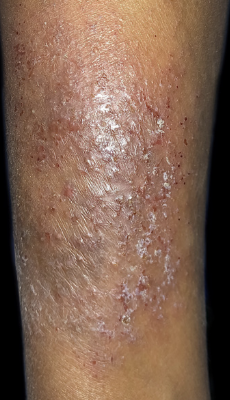This website is best viewed using the horizontal display on your tablet device.
Psoriasis is a chronic inflammatory skin condition that affects an estimated 1 million Canadians. This condition can range in severity, including being moderate to severe.
Psoriasis doesn’t just happen on the surface of your skin—it starts inside your body with your immune system. While the exact cause of psoriasis has not yet been determined, researchers believe it involves a combination of genetic, environmental, and immune factors. Psoriasis is not contagious but instead occurs when the immune system is not functioning properly and causes inflammation.
Plaque psoriasis is the most common form of psoriasis. It can cause itchy and painful plaques on your skin and affect different parts of your body such as your scalp. On lighter skin these plaques tend to be pink or red with silvery scales whereas on darker skin, they may be purple, violet, or dark brown with gray scales.
For most people with psoriasis, symptoms come and go over time. However, different factors, including stress and certain weather conditions, can trigger psoriasis symptoms. These triggers differ for different people.
You will find more information about triggers and some lifestyle tips and tools for managing symptoms below.


People with psoriasis tend to experience symptoms that can sometimes get worse.
Certain triggers may increase the risk of this occurring. By avoiding triggers, you may help prevent symptoms from getting worse.
Triggers vary between individuals, but here are a few common ones:
- Stress
- Alcohol
- Smoking
- Skin injury (e.g., cuts, scrapes, and sunburn)
- Certain medications
- Certain weather conditions
Lifestyle tips and tools for managing symptoms
Based on your personal triggers, the strategies listed below may help reduce your psoriasis symptoms.
- Use a moisturizer that works for you
- Avoid extreme weather conditions
- Bathe in warm water rather than hot water
- Monitor your stress levels
- Exercise
- Quit smoking
- Limit alcohol consumption
This website is best viewed using the vertical display on your mobile device.